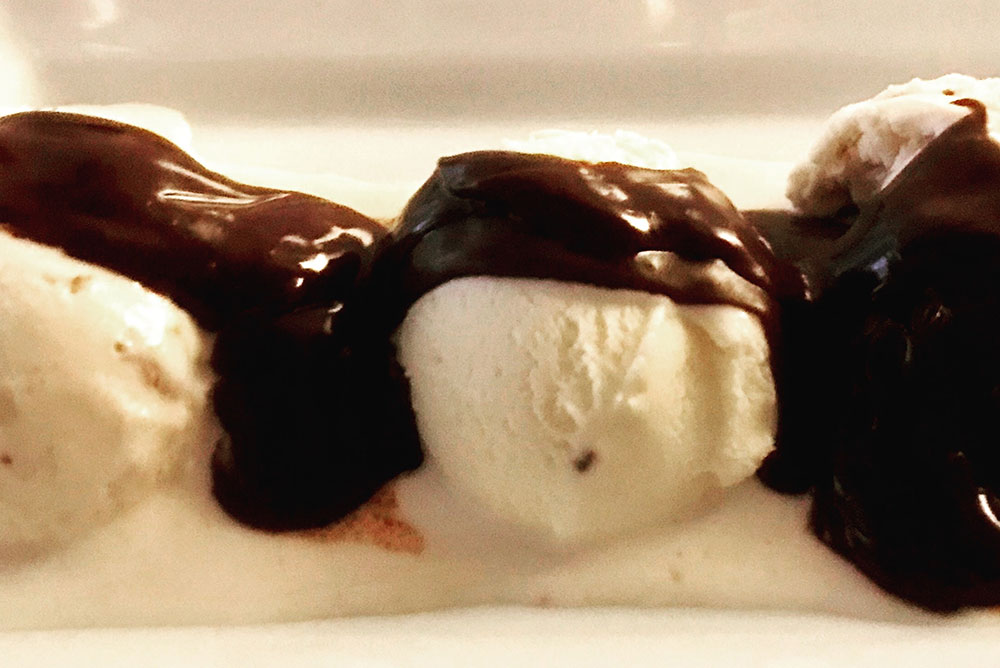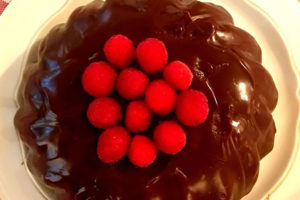
 By Nancy Pollard
By Nancy Pollard
After owning one of the best cooking stores in the US for 47 years—La Cuisine in Alexandria, Virginia—Nancy Pollard writes Kitchen Detail, a blog about food in all its aspects—recipes, film, books, travel, superior sources, and food-related issues.
 JUST KIDDING. Charlene, who is one of the co-conspirator cooks for Kitchen Detail, and I have considerably fewer than 50 versions of this easy, seductive dessert preparation. But the combination of different types of chocolate with hot cream lends itself to all sorts of pleasures. Yes, ganache is a glaze or frosting, but it can also be whipped as a mousse and used as a filling or be served naked as a dessert with a fruit or cookie garnish. And ganache is the very heart and soul of chocolate truffles. It can be thinned to make seductive drips along the edges of a cake. You can make it slightly runny and dunk strawberries, banana, or mango slices into it. You can, with a slightly different technique, make a white chocolate ganache that can be flavored with the hazelnut paste from our Setteveli post, or with pistachio paste. These variations are used extensively for the filling of macarons and other pastries. Ganache is magical.
JUST KIDDING. Charlene, who is one of the co-conspirator cooks for Kitchen Detail, and I have considerably fewer than 50 versions of this easy, seductive dessert preparation. But the combination of different types of chocolate with hot cream lends itself to all sorts of pleasures. Yes, ganache is a glaze or frosting, but it can also be whipped as a mousse and used as a filling or be served naked as a dessert with a fruit or cookie garnish. And ganache is the very heart and soul of chocolate truffles. It can be thinned to make seductive drips along the edges of a cake. You can make it slightly runny and dunk strawberries, banana, or mango slices into it. You can, with a slightly different technique, make a white chocolate ganache that can be flavored with the hazelnut paste from our Setteveli post, or with pistachio paste. These variations are used extensively for the filling of macarons and other pastries. Ganache is magical.
Ganache 101
Take the plunge and get a scale if you don’t currently own one. Join the rest of the world and weigh your ingredients—and it’s particularly important for ganache. Once  you establish the ratio of chocolate to cream, you are in control of the ganache universe.
you establish the ratio of chocolate to cream, you are in control of the ganache universe.
While the base of ganache is simply hot cream mixed into chopped chocolate, there are some essentials you need to know about your ingredients. Using chocolate chips, which are low in cocoa butter and high in additives, will not give you a real ganache. You must use a couverture chocolate, which is made from high-quality cocoa beans and contains a higher percentage of cocoa butter (32% to 39%), rather than chocolate you purchase for snacking or baking. Couverture chocolate is enriched with more cocoa butter and is conched (this is an agitator process that distributes the cocoa butter and cocoa solids to make a smoother and richer-tasting chocolate). Finally, couverture chocolate is tempered, giving it its distinctive sheen, its snap when broken, and its unique deep creamy flavor.
Even if you depend on individual recipes for ganache creations, it is helpful to keep these weight ratios in mind. With a bittersweet chocolate (55% to 65%) the ratio should be 2 parts chocolate to 1 part cream. For a semisweet or milk chocolate (32% to 42%) 2½ parts chocolate to 1 part cream works best. White chocolate uses 3 parts chocolate to 1 part cream. Some chocolate makers prefer equal parts of bittersweet chocolate to cream for their truffle centers or for a thick fudge-type frosting.
Oh, and by cream, we mean a cream within the range of 35% butterfat. You can make an excellent ganache with crème fraîche too, which you can mix with heavy cream or thin with light cream; and that can have a butterfat content from 15% to 30%. Crème fraîche will lend a little more zip to the chocolate flavor.
Some Not-So-Kinky Tips for Success
 If your chocolate is solid rather than in pistole or chip form, chop it up roughly and, with a bench scraper (this one is my personal favorite), add the chunks to a heatproof bowl. Hot cream poured on top will melt the chocolate before it cools down. If the chocolate does not melt in time, you then have to reheat it in a bowl over hot water. And you want the chocolate (particularly white chocolate) to stay below 110F.
If your chocolate is solid rather than in pistole or chip form, chop it up roughly and, with a bench scraper (this one is my personal favorite), add the chunks to a heatproof bowl. Hot cream poured on top will melt the chocolate before it cools down. If the chocolate does not melt in time, you then have to reheat it in a bowl over hot water. And you want the chocolate (particularly white chocolate) to stay below 110F.
Heat your cream up to the boiling point over medium heat. Pour into the chocolate. Allow the mixture to rest for a moment and then stir gently from the middle out to the periphery. Both Charlene and I prefer to use a wood spoon or spoonula rather than a whisk to smooth out the chocolate and cream. We found whisking sometimes caused little bubbles, an interference with the seductive smoothness of a perfect ganache.
You can heat the cream with an herb or spice to create an infused cream before adding to the chopped chocolate; mint leaves or stick cinnamon are good examples.
If you want a shinier surface, simply add a small amount of butter to your ganache. Also, you can add another flavor with an extract, essence, or a liqueur once you have reached your desired emulsion.
When you choose a bittersweet chocolate with a high cocoa content (above 68% cocoa solids) you will need to add about 20% of its weight in glucose, a neutral honey, or corn syrup or it will break.
Any hardened ganache can be gently reheated over barely simmering water without damage. To thin it further, add some thin cream to get to the texture you want. And, if your ganache is too liquid, or if you have some runny ganache left from glazing a cake, add more chopped chocolate to it when it is warmed to thicken it for another use.
Just as for coloring fondant, it’s best to use gel paste colors or even oil-based candy coloring to tint ganache. Don’t use a watery food coloring, which could seize your chocolate and won’t give you the color you’re after. Add a few drops of concentrated color after you’ve mixed your cream and chocolate together to get the desired shade. For the most vibrant colors, start with white chocolate. But use milk or dark chocolate if you’re coloring to black.
Place a piece of plastic wrap directly on the surface of the ganache to stop a sugar crust forming, and leave at room temperature until you get the spreading consistency you desire. Ganache can be kept refrigerated for a couple of weeks or can be frozen for up to three months and defrosted at room temperature.
Covering a Naked Cake
 Once your ganache has cooled and set up to the thickness you want, it is ready to use. If the ganache firms up past the point of being spreadable, place it in the bowl of a stand mixer fitted with the paddle attachment. Beat until the ganache is a spreadable consistency, just a minute or two. A rough idea of how much to use for a cake would be 400gr chocolate/200gr cream for an 8-inch layer, and 500gr chocolate/250gr cream for a 9-inch layer. Charlene and I brush the cake with an imbuing syrup before glazing or frosting. If it is a glaze, put the cake on a cooling rack on a sheet pan, and pour over the still warm ganache.
Once your ganache has cooled and set up to the thickness you want, it is ready to use. If the ganache firms up past the point of being spreadable, place it in the bowl of a stand mixer fitted with the paddle attachment. Beat until the ganache is a spreadable consistency, just a minute or two. A rough idea of how much to use for a cake would be 400gr chocolate/200gr cream for an 8-inch layer, and 500gr chocolate/250gr cream for a 9-inch layer. Charlene and I brush the cake with an imbuing syrup before glazing or frosting. If it is a glaze, put the cake on a cooling rack on a sheet pan, and pour over the still warm ganache.
If you wish to make a light mousse-like ganache for filling (or even as a dessert by itself) you can add to your bittersweet chocolate ganache the same weight in cold cream as the weight of the chocolate you started with. So if you started with 200gr bittersweet chocolate, you will add 200gr cold cream to the cooled ganache for whisking into a mousse. For milk chocolate, it would be 76% of the weight of the chocolate used, and for white chocolate, 50% of the weight. When you have added the cold cream to the cooled ganache (meaning room temperature), whisk in your mixer at medium speed until you get a light, airy texture. Do not over-whip as it will become grainy. And you can alter the ratio of additional cream for a whipped ganache: Add less and you will have a denser mousse.
That Said, Some Twists on Ganache
We thought we would give you a couple of more-unusual recipes for ganache, the seductive Italian Baci di Dama and a meltingly delicious Biscuit de Savoie from France.
Our favorite Baci di Dama recipe is adapted from pastry chef Gina DePalma (who died from ovarian cancer in 2010) and was a shining star at the restaurant Babbo in New York. She took the basic recipe and, in our minds, just made it better. You can bake the cookies, fill them with her ganache and then freeze them. They are still delicious. Her book, Dolce Italiano, is worth purchasing, if you love to bake.
Baci di Dama

½ cup (48gr) almond flour
1 tablespoon (12.5gr) caster or granulated sugar, plus more for rolling
1½ cups (180gr) unbleached all-purpose flour
1/3 cup (50gr) Dutch-processed cocoa powder
¼ teaspoon (1gr) baking powder
½ teaspoon (2.5gr) fine sea salt
1 cup (225gr) unsalted butter, softened
1 cup (110gr) confectioners’ sugar
2 teaspoons (8.4gr) vanilla paste or extract
1 tablespoon (12.6gr) dark rum
For the ganache:
8 ounces (227gr) bittersweet chocolate, chopped
1 tablespoon (14.2gr) butter, softened
¾ cup (173gr) heavy cream
2 tablespoons (26gr) dark rum
-
- Preheat the oven to 325 degrees.
- Toast the almond flour in the oven or on top of the stove until it is golden brown and fragrant, about 10 minutes. Remove from oven and cool completely. When cool, mix in the caster or granulated sugar.
- In a medium bowl, whisk together the flour, cocoa powder, baking powder, and salt and set aside.
- Using an electric mixer with the paddle attachment, beat together the butter and the confectioners’ sugar on medium speed until creamy and light, about 2 minutes.
- Add the vanilla paste or extract and rum and beat. Scrape down the sides of the bowl to make sure the dough is thoroughly mixed.
- On low speed, mix in the flour-cocoa powder mixture, and then the almond-flour-sugar mixture.
- Remove the dough from the bowl, flatten the dough into a disk and refrigerate for about 1 hour.
- Preheat the oven again to 325 degrees. Line two baking sheets with parchment.
- On a lightly floured surface, flatten the dough into a rectangle about ¾-inch thick.
- Using a 1-inch scoop, create balls and place on parchment sheets about 1 inch apart.
- Or you can create logs ¾-inch thick, cut them into 1-inch lengths and roll into balls.
- Bake cookies for 12 to 15 minutes, rotating them halfway through. They should be puffed and slightly cracked on top.
- Cool on cookie sheets for 2 minutes and then remove to wire racks to cool completely.
To make the ganache filling:
1. Place chopped chocolate in a heatproof bowl and heat cream until it just starts to boil at the edges.
2. Pour the cream over the chocolate and allow it to rest for a moment or two, before gently mixing with a spoon or spatula from the center outwards. When the mixture is smooth and glossy, add the rum and stir thoroughly.
3. Allow to cool, until the ganache is thick enough to pipe.
To assemble:
1. Pair the cookies up according to size. Use a pastry bag or a small offset icing spatula and spread the filling on the flat side of half of the cookies and then top each with another to form a sandwich. Store in an airtight container or freeze in Ziploc bags.
- We prefer caster sugar as it dissolves so easily in a batter or dough.
- Make sure you get blanched almond flour and not almond meal, which is coarser and has the residue from the almond skins.
Biscuit de Savoie


The classic Biscuit de Savoie, above left, gets real dazzle when coated with Caramel Chocolate Ganache (see recipe below) and trimmed with fruit.
Serves 8
Ingredients
40gr unsalted butter, plus butter for greasing the pan or mold
50gr all-purpose flour, plus flour or powdered almonds for lining the pan or mold
4 large eggs
2 teaspoons vanilla paste or extract
100gr caster sugar
50gr potato starch
- Preheat oven to 190C.
- Butter an 8-inch/20cm mold of your choice or plain layer cake pan.
- Sift flour (or powdered almonds) to coat the greased mold.
- Separate the yolks from the whites.
- Melt the butter and allow to cool.
- Whisk the yolks in a mixer bowl with the vanilla and half the sugar until the mixture is creamy and smooth.
- Sieve the flour and potato starch together and add it to the yolk mixture at the edges without folding the flours in yet.
- Whisk egg whites until they hold somewhat stiff peaks and then gradually fold in the remaining sugar, still whisking.
- You will have a meringue-like mixture, which you will fold into yolks, flours and cooled melted butter. This folding method keeps the cake lighter than if you folded ingredients in stages.
- Pour the batter into your mold and slide into oven. Bake approximately 25 minutes, using a skewer to test the middle. It should come out clean.
- Allow the cake to cool for about 5 to 10 minutes before releasing it from the pan. Place cake on a cooling rack on top of a half sheet pan.
- You can split the layers and fill with whipped cream. Cover with one of the classic ganaches from this post. The ganache can be decorated with a variety of fruits in any way that you choose.
- Refrigerate until ready to serve.
- Allow cake to rest about 15 minutes at room temperature before slicing.
Caramel Chocolate Ganache
- Chop the chocolate and put into a heat-resistant bowl and set aside.
- Combine the sugar, water, and lemon juice in a heavy saucepan (I use unlined copper as it inhibits crystallizaton).
- Over medium heat, stir just until the sugar has dissolved.
- Allow the syrup to come to a boil, without stirring.
- When the syrup has reached a dark amber color, swirl the pan to distribute the color and heat.
- Then remove the pan from heat and pour in the cream in three increments. There will be a fierce bubbling at first and then the mixture will subside.
- Gradually add the cubed butter and return to medium heat.
- Stir until all ingredients are combined and then pour the caramel cream into the chopped chocolate.
- Allow the cream to start melting the chocolate and then stir in circles (I prefer spoon or spoonula to a whisk) from the middle outward to the edge of the bowl.
- You should attain a glossy pourable thick glaze. which can rest at room temperature for an hour or two.
- If you want a thicker frosting-like texture, allow it to cool either on the counter for three hours or for half an hour in the fridge, until you get the spreadable consistency desired.
